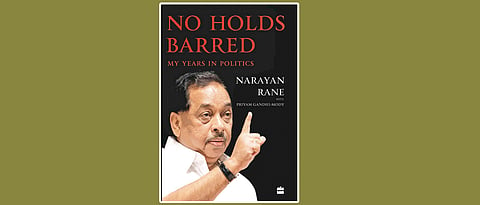

Former chief minister and Rajya Sabha member Narayan Rane has written his memoirs titled No Holds Barred. Rane played a key role as a minister and later as the chief minister in the Bharatiya Janata Party (BJP)-Shiv Sena coalition government in Maharashtra during 1996-99. He later served as a minister in the Congress-Nationalist Congress Party (NCP) government. He was in the Congress till 2017.
As the subtitle suggests, the book deals mainly with Rane’s years in Maharashtra politics. However, we also get a peek into his personal life. Rane has narrated his journey from being a Shiv sainik to a major Shiv Sena leader and from a government clerk to the chief minister. It is an engaging narration. He is candid and has done it with a certain degree of objectivity.
Rane’s story is also partly the story of Shiv Sena, its initial years, its capturing of the Mumbai civic body and eventually the State and the central governments, in alliance with the BJP. Major incidents such as the riots following the Babri Masjid demolition (1992), the 1993 Mumbai bomb attacks, the train blasts and the 26/11 terror attacks in 2008 find mention in the book.
Rane makes no bones about his intentions to enter politics. In fact, the opening lines of the first chapter of his book say it all: ...You need power — unavoidable, discomforting, ruthless power. The kind of power which has a personality of its own and makes sure that the one who wields it is constantly spoken about by one and all — whether it’s good things or bad is inconsequential. The kind of power that makes all other people, especially the people who matter...feel servile. And this kind of power comes from one and only one source in modern India. Rajneeti. (pg 3)
This is what one calls ‘realpolitik’ or ‘practical politics’, which is deciphered by analysts, political experts and observers. It goes beyond the optics that the common man gets to watch on TV channels and on the internet and reads a lot about on social media and in newspapers.
It is probably more hectic behind-the-scenes. Hence, there is more to it than meets the eye. How deals are struck, how chances of some leaders are scuttled and how cards are played — Rane’s memoirs succeed in giving some insights into these.
The image of a muscleman of the Shiv Sena from Chembur may have stuck to Rane still but he says that with his hard work, research and study, he made himself capable, initially as the chairman of BEST, the Mumbai public transport body and later as a minister. He claims to have never spoken on any important issue or topic without studying it.
About his image, Rane writes in the book: ...I was the muscle, Raj the spine and Balasaheb the heart of the Shiv Sena in its heyday. (pg 70)
Rane talks highly of his mentor Bal Thackeray. He has also written about his dealings with top leaders such as Sharad Pawar, Raj Thackeray, Uddhav Thackeray, Manohar Joshi, Subhash Desai, Vilasrao Deshmukh, Ashok Chavan and Prithviraj Chavan. Except for Pawar and Raj, he is critical about all others.
He has also touched upon the much-debated issues such as the Nanar Refinery and the Maratha reservations.
Priyam Gandhi-Mody has made Rane’s story more interesting by her skills as a strategist in advocacy and political brand building. The book will interest all those who are keen to know more about Maharashtra politics, in general, and Narayan Rane’s years in it, in particular.
